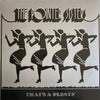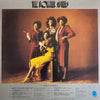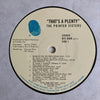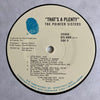







The Pointer Sisters – That's A Plenty
Rarity - Sealed
Vocals - Anita Pointer, Ruth Pointer, Bonnie Pointer, June Pointer
Tom Salisbury – keyboards, Silverton accordion (A1), brass and string arrangements
Herbie Hancock – acoustic piano (A2, B1); electric piano, Hohner clavinet and ARP synthesizer (B4)
David Briggs – acoustic piano (B2)
David Grisman – mandolin (A1)
Jesse Ed Davis – electric guitar (A3)
Jack Viertell – electric guitar (A3)
Bonnie Raitt – slide guitar (A3)
John Shine – guitar (A4)
Bobby Thompson – acoustic guitar (B2)
Weldon Myrick – pedal steel guitar (B2)
John Neumann – bass (A1, A5, B2)
Ron McClure – bass (A2, A4, B1)
Paul Jackson – bass (A3, B4)
Norbert Putnam – bass (B2)
Gaylord Birch – drums (A1 To B1, B3-4)
Ken Buttrey – drums (B2)
Bill Summers – African talking drum, shekere and congas (B4)
Britt Woodman – trombone solo (A4)
Gordon Messick – trombone (A5)
Harry "Sweets" Edison – trumpet solo (A4)
James Goodwin – trumpet (A5)
Jim Rothermel – clarinet (A5)
Floyd Cooley – tuba (A5)
Buddy Spicher – fiddle (B2)
Written by B. Good, J. Cohen, J. Ross, R. Adler (A1), Kenny Clarke, J. Cohen, Dizzy Gillespie, Bruce Good (A2), Son House (A3), A. Pointer, B. Pointer (A4, B2), J. Pointer (A4), L. Pollack, R. Gilbert, B. Good, J. Cohen (A5), Neal Hefti, Jon Hendricks (B1), P.F. Webster, S. Burke (B3), K. Gamble, L. Huff, R. Chambers (B4)
1LP, standard sleeve
Original analog Master tape : YES
Heavy Press : 180g
Record color : Black
Speed : 33 RPM
Size : 12'’
Stereo
Studio
Record Press : Pallas
Label : Speakers Corner
Original Label : Blue Thumb
Recorded at Wally Heider Studios (San Francisco), Quadraphonic Studios (Nashville, Tennessee), United Western Studios (Los Angeles)
Engineered by David Rubinson, Fred Catero, Jeremy Zatkin
Produced by David Rubinson & Friends, Inc.
Remastered by Kevin Gray at AcousTech Mastering
Art Direction, Photography by Herb Greene
Cover Art by Randy Tuten
Originally released in February 1974
Reissued in 2006
Tracks :
Side A:
1. Bangin' On the Pipes/Steam Heat
2. Salt Peanuts
3. Grinning in Your Face
4. Shaky Flat Blues
5. That's A-Plenty/Surfeit, U.S.A.
Side B:
1. Little Pony
2. Fairytale
3. Black Coffee
4. Love in Them There Hills
Awards :
1975 Grammy Award for Best Country Performance by a Duo or Group
Reviews :
“For their second studio long-player, the Pointer Sisters -- consisting of singing siblings Anita, Bonnie, June, and Ruth Pointer -- cut loose with a powerful collection of vintage pop, jazz, and modern R&B. Stylistically, 1973's That's A Plenty is as diverse as their eponymous debut and proves that the immense talents of the Oakland-born quartet were far more than just a one-off fluke. In fact, it was their multiplicity that may have initially prevented them from getting the exposure they deserved. The opening medley couples the tongue-in-cheek saga of their humble beginnings on the tastefully (if not a tad dramatically) arranged "Bangin' On the Pipes" with the rollicking bop of "Steam Heat," derived from the 1954 score of The Pajama Game.
Things are cranked up considerably on the Pointers' breakneck rendition of Dizzy Gillespie's bebop classic "Salt Peanuts." The selection is taken at such an accelerated pace that the flurry might leave the listener exhausted by the song's conclusion. Of equal note are the accompanying instrumentalists, who ably keep pace with substantial verve and sonic savoir-faire. Although almost a musical antithesis, the uptown blues-infused take of Son House's "Grinning in Your Face" (aka "Don't Mind People Grinning in Your Face") unleashes a decidedly funky East Bay vibe. While steeped in the original, it is at once a wholly unique presence. "Shaky Flat Blues" is one of the two Pointer-penned pieces, as the Sisters take their cues more from the sophistication of Duke Ellington than anything happening in early-'70s pop or soul. That's A Plenty's title track is a hot-steppin' Dixieland rag with a tricky syncopation and mile-a-minute lyrics, while "Little Pony" is another classy remake of a venerable jazz number, this time from the luminous Count Basie catalog. The Pointers definitely do it justice by bringing it to an entirely new audience. The surprising rural twang of "Fairytale" is undoubtedly the most incongruous entry on the LP, garnering the ladies their first foray onto the country singles survey. The success resulted in not only a guest appearance at the Grand Ole Opry, but formidable lauds as Elvis Presley covered it to great effect both in the studio -- where it surfaced on 1975's Today -- and on the road. All the more compelling is the dark and lymphatic torch reading of "Black Coffee," brooding and seething with an undercurrent of palpable emotion -- especially during the improvised double-time scat vocals at the tune's conclusion. Perhaps saving their best for last, the redux of Kenny Gamble and Leon Huff's "Love in Them There Hills" is an extended outing that churns and burns into an inspired eight-minutes of unfettered funk, proving that the Pointers are easily as relevant as any of their contemporaries.” AllMusic review by Lindsay Planer
“If you spun the dial of your AM/FM radio on any given day in the early 1980s, chances are you heard a Pointer Sisters' record. The group was in heavy rotation in a variety of formats whose playlists included Duran Duran, Bruce Springsteen and the Human League or Patti LaBelle and Earth, Wind and Fire. The electro-pop sound of the Pointer Sisters' "Jump (For My Love)," "Automatic" or "Neutron Dance" dominated the charts during the first half of the decade. The popularity of these records rested in the accessibility of their lyrical content and melodic structure and the hypnotic nature of their rhythms. Anyone could sing "Jump for My Love" after hearing the chorus once; after "Neutron Dance" was featured prominently in Eddie Murphy's breakout film Beverly Hills Cop, it was regularly mixed into Jane Fonda-inspired aerobic workout routines. The sonic recipe that catapulted the Pointer Sisters into this chapter of their crossover success combined the gospel-infused vocals of soul music and the polyrhythmic, metronomic grooves of funk and disco with an instrumental palette that represented the era's new waves of experimentation. These songs partook of the musical technology and electronic sounds that permeated the music of artists like Stevie Wonder, Herbie Hancock and Kraftwerk. In a decade that came to be defined by economic uncertainty, the developing AIDS crisis and an expanding war on drugs that precipitated the ballooning of the prison industrial complex, the Pointer Sisters inspired audiences to dance, to love and to sing with abandonment. These songs promoted the reclamation of personal freedom and joy that was often overshadowed by the angst and anxiety of the decade.” NPR Music eview by Tammy Kernodle.
Ratings :
AllMusic : 4 / 5 ; Discogs : 3.78 / 5 ; The Encyclopedia of Popular Music : 2 / 5 ; The New Rolling Stone Record Guide : 2 / 5


